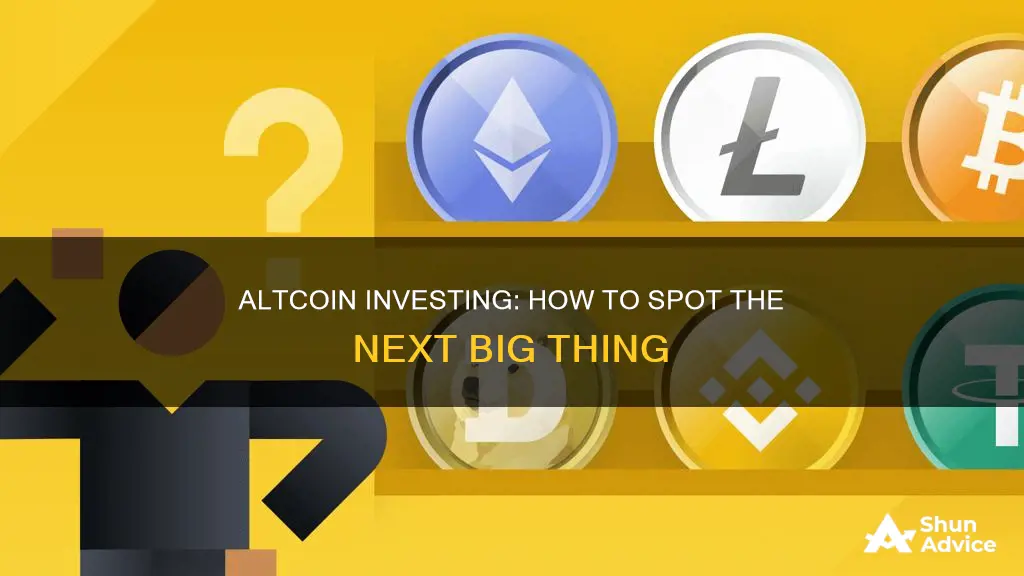
Altcoins are any cryptocurrency that is not Bitcoin. There are thousands of altcoins on the market, so it is difficult to tell which might be legitimate. Altcoins are incredibly risky investments and it's important to do your research before investing. If you're unsure, talk to a financial advisor who is familiar with cryptocurrencies to help you decide if they are suitable for your portfolio.
| Characteristics | Values |
|---|---|
| Type of Altcoin | Stablecoins, mining-based coins, staking-based coins, governance tokens |
| Purpose | Savings, sending money, investment, improving aspects of Bitcoin, providing a service, facilitating blockchain technology |
| Risk | High risk of scams, failure, volatility, fraud, hacks, manipulation |
| Rewards | High potential rewards, high upside in terms of percentage gain |
| Number | Thousands |
| Purchase | Difficult to buy, only available on certain exchanges |
What You'll Learn

Understand the risks
Investing in altcoins is incredibly risky, and you may be more likely to lose than win on an investment if you don't do adequate research. Altcoins are any cryptocurrency that is not Bitcoin (and sometimes Ethereum), and there are thousands of them on the market. This means it is difficult to tell which might be legitimate and which are not.
The future of altcoins is impossible to predict, but if the blockchain they were designed for continues to be used and developed, the altcoins will continue to exist. However, it is likely that most of the thousands of altcoins will not survive.
Altcoins are driven entirely by market sentiment. Because they are not backed by the assets or cash flow of an underlying company, they are vulnerable to extreme volatility. This means that if an altcoin falls out of favour, it may not return to favour, costing you most or all of your investment.
Altcoins are also vulnerable to market manipulation and hacks, especially those with smaller capitalizations.
It is important to ask whether you are wagering only money you can afford to lose. Cryptocurrency and other financial markets are not places to invest money that you need, such as your rent money.
Before investing in an altcoin, you should understand who is issuing and sponsoring it, and what their background is. You should also know how and when you can sell your investment, what it will cost to sell, and what specific rights are afforded to you.
With so many altcoins available, it is challenging to pick out the best ones to invest in. They present a greater risk, and many of the smaller altcoins are dubious investments or scams.
Approach all cryptocurrencies with caution, and remember that even if you decide to buy altcoins, they should only make up a small part of your portfolio.
Elon's Bitcoin Investment: A Timeline and Analysis
You may want to see also

Research the team behind the altcoin
Before investing in an altcoin, it is crucial to conduct thorough research on the team behind the project. This involves evaluating the credentials, experience, and reputation of the team members within the crypto community and blockchain ecosystem. Here are some key considerations:
- Experience and Reputation: Assess whether the team members have worked on other successful and reputable projects in the past. Are they well-known and respected in the crypto community? Do they have a track record of delivering on their promises?
- Expertise and Innovation: Determine if the team comprises experts in their respective fields. Are they working on new innovations and technology, or simply replicating existing ideas? What unique skills or perspectives do they bring to the project?
- Accessibility and Professionalism: Evaluate how accessible and responsive the team is. Are they open to communication and willing to address investor concerns? Do they conduct themselves professionally in public discussions and forums?
- Transparency and Identity: Verify the identities of the team members. Are they transparent about their backgrounds and qualifications, or do they choose to remain anonymous? Transparency builds trust and reduces the risk of scams.
- Activity and Engagement: Check the project's GitHub repository to gauge the team's level of activity and engagement with the codebase. A well-maintained and regularly updated project is more likely to be reliable.
- Social Media Presence: Explore the team members' social media profiles and their engagement in relevant online communities. This can provide insights into their reputation, professionalism, and involvement in the project.
- Advisors and Partnerships: Look into the advisors and partnerships associated with the project. Are there any well-known advisors or collaborations with established companies? This can indicate the project's legitimacy and potential for success.
By thoroughly researching the team behind an altcoin, investors can gain a better understanding of the project's credibility, expertise, and potential for success. It is crucial to remember that the presence of a strong and experienced team reduces the risk of scams and increases the likelihood of a successful and well-supported altcoin project.
Bitcoin Gold: Where to Invest and Key Strategies
You may want to see also

Assess the altcoin's unique value proposition
When assessing an altcoin's unique value proposition, it is crucial to evaluate all the available information on the particular coin. This includes understanding the cryptocurrency's use cases, its network, and the team behind the project. Here are some key considerations:
- Whitepaper Analysis: Scrutinise the token's whitepaper, which outlines its use cases, goals, and the team's vision. This will provide a clear picture of how the altcoin will benefit its users.
- Demand and Supply Analysis: Understand how the altcoin navigates supply and demand. Look for incentives that will increase demand while maintaining a stable or decreasing supply. When demand outpaces supply, prices rise, fuelling further demand.
- Team and Stakeholder Assessment: Conduct thorough research on the team and stakeholders behind the project. Evaluate their credentials, reputation in the crypto community, and past projects. A strong and experienced team adds credibility and value to the altcoin.
- Unique Functionality: Identify if the altcoin has a specific set of use cases or solves a particular problem through blockchain technology. An altcoin with a clear and useful purpose is more likely to have a future as a store of value.
- Comparison to Existing Coins: Evaluate if the altcoin offers something substantial beyond replicating an existing coin. Is it aiming to become bigger than Bitcoin, which could be a red flag?
- Developer Activity: Assess the developers' capabilities and reputation, their track record of updates, and their communication with investors. A dedicated and active development team contributes positively to the altcoin's value.
- History and Reputation: Consider the altcoin's history, including any scandals or security breaches. A longer market presence with a consistent value increase is generally more favourable.
- Market Performance: Evaluate the altcoin's trade volume and the number of people using it. Higher trade volumes and wider adoption indicate a healthier market performance.
- Acquisition Ease: Determine how easy it is to acquire the altcoin through various payment methods, such as credit card or bank transfer. Altcoins that are easily accessible have better potential to scale and reach a broader market.
Bitcoin Investment: Timing the Market or Time in the Market?
You may want to see also

Consider its market capitalization
Market capitalization, or market cap, is a crucial metric in the world of cryptocurrency. It is a measure of the total value of a specific cryptocurrency and can be calculated by multiplying the current price per token by the total number of coins in circulation.
Market cap is essential for understanding the value of a cryptocurrency and can be used to assess a company's structure, profitability, and a stock's value. It is a key profitability measure and is used in equations to determine significant metrics such as price-to-earnings and price-to-free-cash-flow ratios.
Market cap is generally broken down into categories such as micro-cap, small-cap, mid-cap, large-cap, and ultra or mega-cap. Large-cap cryptocurrencies typically have market caps above $10 billion and include well-known names such as Bitcoin and Ethereum. On the other hand, small-cap cryptocurrencies have market caps in the tens of millions to a few hundred million dollars and are considered high-risk, high-reward assets.
Market cap can be used to assess the relative size of a cryptocurrency within the broader crypto marketplace, providing a standardized method for investors to gauge its size in relation to others. It is also a useful indicator of liquidity, with cryptocurrencies with higher market caps often having greater liquidity and higher trading volume, making them easier to buy and sell.
Additionally, market cap plays a vital role in shaping investment strategies, allowing investors to make informed decisions, formulate a comprehensive strategy, and evaluate the growth potential and risks associated with specific digital assets. For example, investors may choose to allocate their funds across a range of cryptocurrency size categories to spread risk across their portfolio.
However, it is important to note that market cap should not be the sole determinant for investment decisions. Other factors such as historical performance, the development team, and the competitive landscape should also be considered. Cryptocurrency markets can be highly volatile, and market caps can change rapidly due to price swings and market manipulation, particularly for newer and smaller-cap cryptocurrencies.
In summary, market capitalization is a critical factor to consider when evaluating the worth of an altcoin investment. It provides insights into the relative size, risk, liquidity, and growth potential of a cryptocurrency, helping investors make more informed decisions.
Smartly Diversifying Your Crypto Portfolio: How Many Coins?
You may want to see also

Evaluate its technical capacity
When evaluating the technical capacity of an altcoin, it is important to consider the technology and use case of the project. This involves understanding the problem that the altcoin is trying to solve and whether blockchain is the right solution. For example, XRP is a cryptocurrency designed for cross-currency payments, with faster transaction speeds and lower fees than traditional banks.
Another aspect to consider is the level and quality of development activity, including the stability and safety of the network from attacks. This includes assessing the consensus mechanism used by the altcoin, such as proof-of-work or proof-of-stake, and how it validates transactions or produces blocks.
Additionally, it is crucial to evaluate the team behind the project, including their capabilities, reputation, and track record. This can provide insights into the potential success of the altcoin and its long-term viability.
- What problem is the altcoin trying to solve, and is blockchain the best solution?
- Is the altcoin's technology better than off-chain alternatives?
- Are there any technical challenges or limitations to the widespread use of the altcoin?
- Are there any plans for future technological advancements or innovations?
- What is the track record of the development team, and do they have the necessary capabilities and reputation?
- Is the team actively working on updates and improvements to the altcoin?
- Is the altcoin network stable and safe from potential attacks?
By considering these factors, you can gain a deeper understanding of an altcoin's technical capacity and make a more informed investment decision.
Bitcoin: Should You Invest?
You may want to see also
Frequently asked questions
An altcoin is any cryptocurrency that is not Bitcoin. Some people also consider altcoins to be any cryptocurrency that is not Bitcoin or Ethereum.
There are several types of altcoins, including stablecoins, mining-based coins, staking-based coins, and governance tokens.
Altcoins can improve on aspects of Bitcoin, have a high potential reward, and offer a large selection of options. However, they are risky investments, as many are scams or end up failing, and they don't have Bitcoin's first-mover advantage or market share.
It's important to do your research and only invest money you can afford to lose. Look into who is issuing the altcoin, what it will be used for, and whether there is a clear purpose and demand for the blockchain and token.
Some of the most popular altcoins include Ethereum, Tether, USD Coin, Dogecoin, and Binance Coin.







